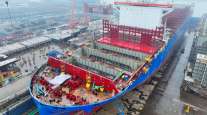Bloomberg News
US, China See Progress on Trade

[Stay on top of transportation news: Get TTNews in your inbox.]
The U.S. and China signaled progress in the first phase of a potential trade deal Nov. 1 after a call between top negotiators.
Representatives from the world’s two largest economies — China’s Vice Premier Liu He, U.S. Treasury Secretary Steven Mnuchin and U.S. Trade Representative Robert Lighthizer — talked by phone and afterward, both sides released statements describing the call as “constructive.”
The Chinese Ministry of Commerce said it achieved a “consensus in principle,” and the U.S. cited progress and that discussions will continue at the deputy level.
“They made progress in a variety of areas and are in the process of resolving outstanding issues,” the USTR said in a statement.
Stocks stayed near record highs amid signs of a breakthrough and after a report earlier that showed stronger-than-expected job growth in the U.S.
White House economic adviser Larry Kudlow said earlier Nov. 1 that additional tariffs on Chinese goods are still possible as negotiators from the U.S. and China hash out details of the potential first step in a trade accord.
“They’re still on the table until this phase one deal is completed, or worst case not completed,” Kudlow said in an interview on Bloomberg Television. “The president has hinted, depending on the process of phase one, he may be willing, I say may be willing, to take a look at those tariffs.”
Kudlow’s comments came before a ruling by the World Trade Organization on Nov. 1 that awarded China permission to impose $3.6 billion in sanctions against the U.S. The case predates the tariff war between the two nations but may add a layer of tension to ongoing talks.
Negotiators are close to finishing details of the pact on China’s increased purchases of U.S. agriculture products, currency stability and opening of financial services markets to American firms, Kudlow said. They’ve also made “excellent progress” on the issue of intellectual property theft, he said. Disputes around so-called forced tech transfer will likely not be resolved until a possible phase two of the deal.
Both countries are seeking an alternate location to sign a deal, if they reach one, after Chile canceled a summit this month where President Donald Trump and China’s leader Xi Jinping were aiming to meet.
Want more news? Listen to today's daily briefing:




